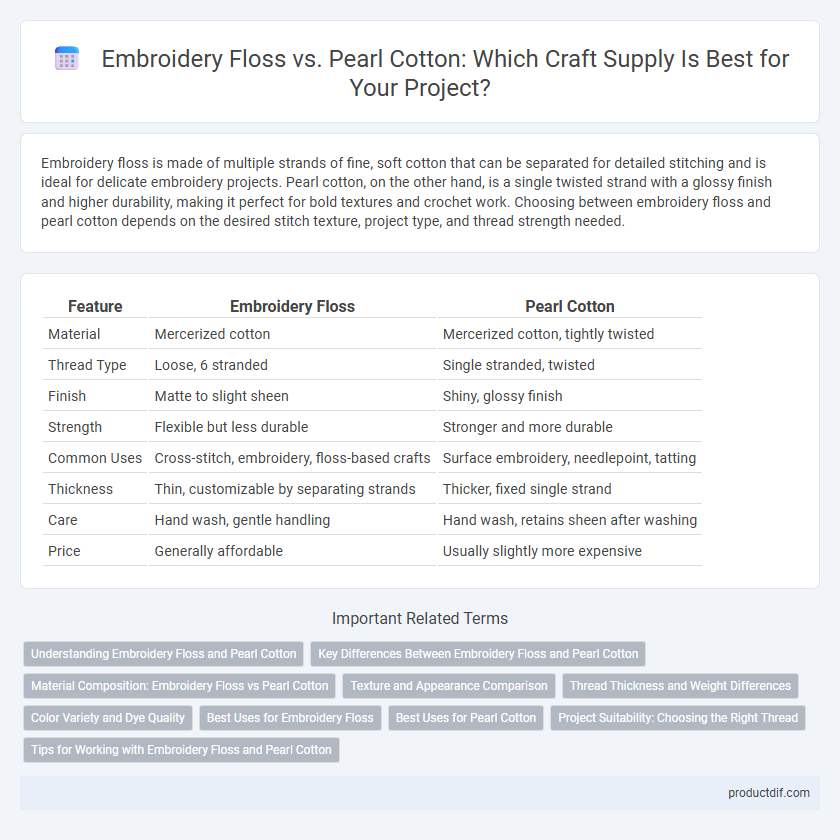Embroidery floss is made of multiple strands of fine, soft cotton that can be separated for detailed stitching and is ideal for delicate embroidery projects. Pearl cotton, on the other hand, is a single twisted strand with a glossy finish and higher durability, making it perfect for bold textures and crochet work. Choosing between embroidery floss and pearl cotton depends on the desired stitch texture, project type, and thread strength needed.
Table of Comparison
| Feature | Embroidery Floss | Pearl Cotton |
|---|---|---|
| Material | Mercerized cotton | Mercerized cotton, tightly twisted |
| Thread Type | Loose, 6 stranded | Single stranded, twisted |
| Finish | Matte to slight sheen | Shiny, glossy finish |
| Strength | Flexible but less durable | Stronger and more durable |
| Common Uses | Cross-stitch, embroidery, floss-based crafts | Surface embroidery, needlepoint, tatting |
| Thickness | Thin, customizable by separating strands | Thicker, fixed single strand |
| Care | Hand wash, gentle handling | Hand wash, retains sheen after washing |
| Price | Generally affordable | Usually slightly more expensive |
Understanding Embroidery Floss and Pearl Cotton
Embroidery floss is a soft, divisible thread made of six-strand cotton, ideal for detailed needlework and cross-stitch, offering flexibility in thickness and color blending. Pearl cotton, also known as perle cotton, features a twisted, non-divisible structure with a lustrous finish and varying thicknesses, making it perfect for satin stitching and decorative hand embroidery. Choosing between embroidery floss and pearl cotton depends on the desired texture, sheen, and stitch technique in craft projects.
Key Differences Between Embroidery Floss and Pearl Cotton
Embroidery floss consists of six loosely twisted strands, offering flexibility for detailed stitching and blending colors, while pearl cotton is a single, tightly twisted thread providing a smooth, lustrous finish ideal for bold, durable designs. Embroidery floss is made from cotton with a soft texture, whereas pearl cotton features a mercerized cotton fiber that enhances its sheen and strength. Pearl cotton's thickness ranges from size 3 to 12, significantly thicker than floss, making it suitable for projects like crochet and quilting that require more texture and durability.
Material Composition: Embroidery Floss vs Pearl Cotton
Embroidery floss is typically made from six strands of mercerized cotton, offering a smooth, glossy finish ideal for detailed stitching and vibrant color blending. Pearl cotton, composed of a single, twisted strand of mercerized cotton, provides a thicker, stronger thread with a lustrous sheen perfect for bold, textured embroidery and decorative stitching. The difference in material composition affects both the thread's durability and visual effect, making embroidery floss suited for fine work and pearl cotton better for projects requiring a more substantial thread.
Texture and Appearance Comparison
Embroidery floss features a soft, smooth texture with a slight sheen, ideal for detailed and delicate stitching, while pearl cotton has a firm, lustrous finish with tightly twisted strands that create a rounded, glossy appearance. Floss tends to separate easily into finer strands allowing more control over thread thickness, whereas pearl cotton maintains its thickness for bold, dimensional stitches. The choice between the two affects not only the tactile experience but also the visual impact of the embroidery project.
Thread Thickness and Weight Differences
Embroidery floss is typically made of six loosely twisted strands of cotton, offering varying thicknesses when separated, while pearl cotton is a single, tightly twisted thread available in specific thickness sizes such as size 5 and size 8. Pearl cotton is heavier and thicker compared to embroidery floss, providing a smooth, lustrous finish ideal for projects requiring durability and texture. Understanding the thread weight and thickness differences is crucial for selecting the right material for detailed embroidery or decorative stitching in craft supplies.
Color Variety and Dye Quality
Embroidery floss offers an extensive color variety with hundreds of shades, making it ideal for projects requiring subtle gradients and detailed color work. Pearl cotton, while available in a more limited palette, features a higher dye quality that results in vibrant, long-lasting hues resistant to fading. Both fibers undergo rigorous dyeing processes, but embroidery floss prioritizes range while pearl cotton emphasizes colorfastness and sheen.
Best Uses for Embroidery Floss
Embroidery floss is ideal for detailed hand embroidery projects such as cross-stitch, needlepoint, and decorative stitching due to its smooth texture and six-strand composition that can be separated for varying thickness. It offers vibrant color options and flexibility, making it suitable for intricate designs on fabric like clothing and home decor. Compared to pearl cotton, floss provides greater versatility for layering stitches and achieving fine, delicate patterns.
Best Uses for Pearl Cotton
Pearl cotton is ideal for detailed embroidery and crochet projects due to its smooth, lustrous finish and resistance to fraying. Its strong, non-divisible strands make it perfect for creating raised, textured stitches and durable seams in fine needlework. Compared to embroidery floss, pearl cotton provides a polished look suited for intricate patterns and decorative accents on fabric crafts.
Project Suitability: Choosing the Right Thread
Embroidery floss offers a smooth, versatile texture ideal for detailed stitching and intricate designs, making it perfect for detailed embroidery projects and delicate fabrics. Pearl cotton features a twisted, thicker thread that provides a durable, raised finish, suited for bold patterns, crochet, and embellishments needing more texture and strength. Selecting the right thread depends on the project's complexity and fabric type, with floss favoring fine, precise work and pearl cotton enhancing durability and dimensional effects.
Tips for Working with Embroidery Floss and Pearl Cotton
Embroidery floss offers smooth, divisible strands ideal for intricate stitching, while pearl cotton provides a lustrous, twisted texture perfect for bold, textured designs. When working with embroidery floss, separate strands carefully to avoid fraying and maintain tension for even stitches. For pearl cotton, avoid excessive pulling to prevent untwisting and use shorter thread lengths to preserve its sheen and structure.
Embroidery floss vs Pearl cotton Infographic

 productdif.com
productdif.com